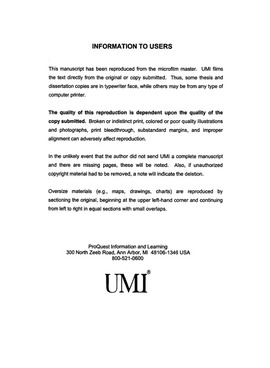| dc.contributor.advisor | Marquez, Ismael P., | en_US |
| dc.contributor.author | Pardo, Diana. | en_US |
| dc.date.accessioned | 2013-08-16T12:18:55Z | |
| dc.date.available | 2013-08-16T12:18:55Z | |
| dc.date.issued | 2003 | en_US |
| dc.identifier.uri | https://hdl.handle.net/11244/578 | |
| dc.description.abstract | I examine the theme of black identity with an emphasis on pride in order to counteract the portrayal of black images as negative stereotypes. I illustrate how they assume the responsibility of questioning the national values that shape the thought of Caribbean society through a literature of resistance. I demonstrate how these writers humanize the image of blacks by representing various aspects and dimensions of a more credible and genuine black psyche. Their discourse replaces pessimism with a more authentic image of blacks in the Caribbean. | en_US |
| dc.description.abstract | The application of the theory of "deterritorialization" as proposed by Gilles Deleuze and Felix Guattari, illustrates the use of the dominant language by a minority for the creation of a style alien to that of the standard. The creation of this style offers another possibility of expression for that particular group. Considered "maroon literature" by Josaphat Kubayanda in Minority Discourse and the African Collective: Some Examples from Latin American and Caribbean Literature, (1985), the term, which has roots in "guerrilla resistance movements among Blacks..." (124), allows these writers to escape the canon's criteria while resorting to one that reflects the distinctive aspects that shaped the black psyche in the Caribbean. | en_US |
| dc.description.abstract | The absence of dignified black images in Spanish-Caribbean literature has encouraged a new discourse among contemporary writers. In the last thirty years, the trend among some Spanish-Caribbean writers has been to focus on black identity with an emphasis on pride that counteracts the negative black images in earlier works. My dissertation concentrates on the works Encancaranublado y otros cuentos de naufragio, (1994), by Ana Lydia Vega (1946) from Puerto Rico, Caribe africano en despertar, (1984), by Blas Jimenez (1948) from the Dominican Republic, and Where the Island Sleeps Like a Wing, (1985) by Nancy Morejon (1944) from Cuba. These writers aim toward a new discourse, which shuns myths and stereotypes of blacks, replacing these with more representative and authentic images of blacks in the Caribbean. | en_US |
| dc.format.extent | ix, 148 leaves ; | en_US |
| dc.subject | Literature, Modern. | en_US |
| dc.subject | MorejÔΩ̜n, Nancy, 1944- Criticism and interpretation. | en_US |
| dc.subject | Vega, Ana Lydia, 1946- Criticism and interpretation. | en_US |
| dc.subject | JimÔΩ̜nez, Blas R. Criticism and interpretation. | en_US |
| dc.subject | Literature and history Latin America History. | en_US |
| dc.subject | Literature, Latin American. | en_US |
| dc.subject | Literature, Caribbean. | en_US |
| dc.title | The denunciation of self-deprecation in the works of Ana Lydia Vega, Blas Jimenez, and Nancy Morejon. | en_US |
| dc.type | Thesis | en_US |
| dc.thesis.degree | Ph.D. | en_US |
| dc.thesis.degreeDiscipline | Department of Modern Languages, Literatures, and Linguistics | en_US |
| dc.note | Director: Ismael P. Marquez. | en_US |
| dc.note | Source: Dissertation Abstracts International, Volume: 64-03, Section: A, page: 0925. | en_US |
| ou.identifier | (UMI)AAI3082935 | en_US |
| ou.group | College of Arts and Sciences::Department of Modern Languages, Literatures, and Linguistics | |
